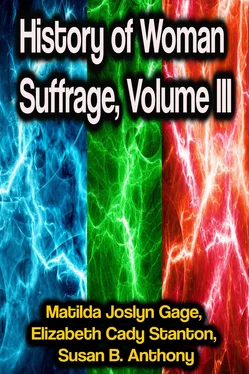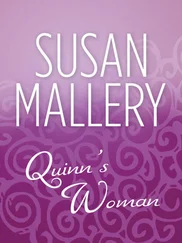In view of these facts, does it not appear that if there is any one distinctively feminine characteristic, it is the mother-instinct for government? But now with clearer vision we reread the record of the past. True, we find no Raphael or Beethoven, no Phidias or Michael Angelo among women. No woman has painted the greatest picture, carved the finest statue, composed the noblest oratorio or opera. Not many women's names appear after Joan of Arc's in the long list of warriors; but, as a ruler, woman stands to-day the peer of man.
While man has rendered such royal service in the realm of art, woman has not been idle. Infinite wisdom has intrusted to her the living, breathing marble or canvas, and with smiles and tears, prayers and songs has she patiently wrought developing the latent possibilities of the divine Christ-child, the infant Washington, the baby Lincoln. Ah! since God and men have intrusted to woman the weightiest responsibility known to earth, the development and education of the human soul, need you fear to intrust her with citizenship? Is the ballot more precious than the soul of your child? If it is safe in the home, in the school-room, the Sunday-school, to place in woman's hands the education of your children, is it not safe to allow that mother to express her choice in regard to which one of these sons, her boys whom she has taught and nursed, shall make laws for her guidance?
Just here, in imagination, is heard the question, "How much help could we expect from women on financial questions?" We accept the masculine idea of woman's mathematical deficiencies. We have had slight opportunity for discovering the best proportions of a silver dollar, owing to the fact that the family specimens have been zealously guarded by the male members; and yet, we may have some latent possibilities in that direction, since already the "brethren" in our debt-burdened churches wail out from the depths of masculine indebtedness and interest-tables, "Our sisters, we pray you come over and help us!" And, in view of the fact of the present condition of finances, in view of the fact of the enormous taxes you impose upon us, can you look us calmly in the face and assert that matters might, would, should, or could have been worse, even though Julia Ward Howe, Mary A. Livermore, or Elizabeth Cady Stanton, had voted on the silver bill?
A moment since I referred to the great responsibilities of motherhood, and doubtless your mental comment was, "Yes, that is woman's peculiar sphere; there she should be content to remain." It is our sphere—beautiful, glorious, almost infinite in its possibilities. We accept the work; we only ask for opportunity to perform it. The sphere has enlarged, that is all. There has been a new revelation. That historic "first gun" proclaimed a wonderful message to the daughters of America; for, when the smoke of the cannonading had lifted, the entire horizon of woman was broadened, illuminated, glorified. On that April morn, when a nation of citizens suddenly sprang into an army of warriors, with a patriotism as intense, a consecration as true, American women quietly assumed their vacated places and became citizens. New boundaries were defined. A Mary Somerville or Maria Mitchell seized the telescope and alone with God and the stars, cast a new horoscope for woman. And the new truth, electrifying, glorifying American womanhood to-day, is the discovery that the State is but the larger family, the nation the old homestead, and that in this national home there is a room and a corner and a duty for "mother." A duty recognized by such a statesman as John Adams, who wrote to his wife in regard to her mother:
Your mother had a clear and penetrating understanding and a profound judgment, as well as an honest, a friendly and charitable heart. There is one thing, however, which you will forgive me if I hint to you. Let me ask you rather if you are not of my opinion. Were not her talents and virtues too much confined to private, social and domestic life? My opinion of the duties of religion and morality comprehends a very extensive connection with society at large and the great interests of the public. Does not natural morality and, much more, Christian benevolence make it our indispensable duty to endeavor to serve our fellow-creatures to the utmost of our power in promoting and supporting those great political systems and general regulations upon which the happiness of multitudes depends? The benevolence, charity, capacity and industry which exerted in private life would make a family, a parish or a town happy, employed upon a larger scale and in support of the great principles of virtue and freedom of political regulations, might secure whole nations and generations from misery, want and contempt.
Intense domestic life is selfish. The home evidently needs fathers as much as mothers. Tender, wise fatherhood is beautiful as motherhood, but there are orphaned children to be cared for. These duties to the State and nation as mothers, true to the highest needs of our children, we dare not ignore; and the nation cannot much longer afford to have us ignore them.
As statesmen, walking on the shore piled high with the "drift-wood of kings," the wrecks of nations and governments, you have discovered the one word emblazoned as an epitaph on each and every one, "Luxury, luxury, luxury!" You have hitherto placed a premium upon woman's idleness, helplessness, dependence. The children of most of our fashionable women are being educated by foreign nurses. How can you expect them to develop into patriotic American statesmen? For the sake of country I plead—for the sake of a responsible, exalted womanhood; for the sake of a purer womanhood; for home and truth, and native land. As a daughter, with holiest, tenderest, most grateful memories clinging to the almost sacred name of father; as a wife, receiving constant encouragement, support, and coöperation from one who has revealed to her the genuine nobility of true manhood; as a mother, whose heart still thrills at the first greeting from her little son; and as a sister, watching with intense interest the entrance of a brother into the great world of work, I could not be half so loyal to woman's cause were it not a synonym for the equal rights of humanity—a diviner justice for all!
With one practical question I rest my case. The world objected to woman's entrance into literature, the pulpit, the lyceum, the college, the school. What has she wrought? Our wisest thinkers and historians assert that literature has been purified. Poets and judges at international collegiate contests award to woman's thought the highest prize. Miss Lucia Peabody received upon the occasion of her second election to the Boston school board the highest vote ever polled for any candidate. Since woman has proved faithful over a few things, need you fear to summon her to your side to assist you in executing the will of the nation? And now, yielding to none in intense love of womanhood; standing here beneath the very dome of the national capitol overshadowed by the old flag; with the blood of the revolutionary patriots coursing through my veins; as a native-born, tax-paying American citizen, I ask equality before the law.
Elizabeth Cady Stanton said: Gentlemen of the Committee : In appearing before you to ask for a sixteenth amendment to the United States Constitution, permit me to say that with the Hon. Charles Sumner, we believe that our constitution, fairly interpreted, already secures to the humblest individual all the rights, privileges and immunities of American citizens. But as statesmen differ in their interpretations of constitutional law as widely as they differ in their organizations, the rights of every class of citizens must be clearly defined in concise, unmistakable language. All the great principles of liberty declared by the fathers gave no protection to the black man of the republic for a century, and when, with higher light and knowledge his emancipation and enfranchisement were proclaimed, it was said that the great truths set forth in the prolonged debates of thirty years on the individual rights of the black man, culminating in the fourteenth and fifteenth amendments to the constitution, had no significance for woman. Hence we ask that this anomalous class of beings, not recognized by the supreme powers as either "persons" or "citizens" may be defined and their rights declared in the constitution.
Читать дальше












